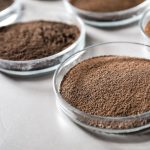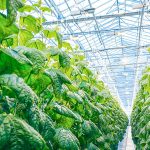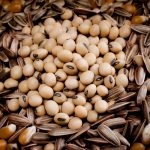SGS Seed and Crop News: September 2019
Seed and Crop eNewsletter: September 2019
In this edition of SGS BioVision News, we will discuss:
- The building block to fertility management: Fall soil nutrient testing
- SGS BioVision issues ISTA certificates for export shipments
- Grains Analytical Lab delivers full-service wheat, flour and dough testing
- Weather conditions increase importance of corn silage analysis
- Announcing Blackleg Race testing to optimize knowledge for future crops
- Ask an Analyst: How do I properly sample and ship tissue samples?
THE BUILDING BLOCKS TO FERTILITY MANAGEMENT: FALL SOIL NUTRIENT TESTING
In the fall, harvested fields often offer excellent conditions for soil sampling. This presents a great window of opportunity to sample, test and determine a nutrient management plan to apply in the autumn months. Many growers choose a routine of soil testing after wheat harvest so that their 3-year sampling rotation remains intact. Where manure is part of the nutrient plan, testing both the soil and manure allows for the optimal application rates to be calculated and can target areas of fields most in need of additional nutrient and organic matter. Beyond the usual N-P2OS-K20 testing of fertilizer, we can also measure all mineral constituents and heavy metals in your fertilizer product, whether it is granular fertilizer or liquid.
SGS BIOVISION ISSUES ISTA CERTIFICATES FOR EXPORT SHIPMENTS
Following the announcement of our International Seed Testing Association (ISTA) accreditation, we are pleased to announce that we are now issuing Orange International Seed Lot Certificates (OIC) and Blue International Seed Sample Certificates (BIC) for seed and grain. This is part of our commitment to further supporting Canadian seed companies with meeting global export requirements. Testing includes:
- Germination
- Other Seed Determination
- Percent Purity
- Tetrazolium
- Weight Determination
- Moisture
For further information and our sample submission form, contact BioVision.SherwoodPark@sgs.com.
GRAINS ANALYTICAL LAB DELIVERS FULL-SERVICE WHEAT, FLOUR AND DOUGH TESTING
The time of year is here again! With a new wheat harvest comes the expectations of changes to milling and baking characteristics. SGS Grains Analytical Testing Laboratory (GATL) is a full-service wheat, flour and dough rheology testing facility, with multiple instruments that allow the quantification of dough properties and bake characteristics of wheat. The lab is a unique result of a joint venture between SGS and a Canadian farmer organization, the Grain Farmers of Ontario. Flour for quality analysis is obtained from milling wheat on a Buhler laboratory mill (MLU-202). This is the most preferred method worldwide to obtain high quality flour for reliable testing. Dough and gluten properties, which vary from one flour sample to the next, are critical to the baking process and the resulting end product quality. At the GATL, dough behavior and gluten quality can be predicted by testing with state-of-the-art equipment such as a Farinograph, Extensograph, and Alveograph. The lab also has a bake room with all the necessary equipment for baking standard quality bread and cookies. Products are evaluated for both physical and sensory parameters.
For more information, please contact the lab at 226.203.2738 or ca.agri.guelph.lab@sgs.com.
WEATHER CONDITIONS INCREASE IMPORTANCE OF CORN SILAGE ANALYSIS?
Late planting into poor soil conditions, followed by a dry July, have contributed to uneven crop growth across many fields. Monitoring whole plant moisture is especially important this year, as maturity and dry-down are variable. Tasseling started in late July but was highly variable from farm to farm, and even across the same field. Once a one-third milk line has been achieved, monitoring whole plant moisture may be advantageous. The importance of nutritional testing becomes heightened given the variability of silage crops due to recent weather conditions. Gauging cutting date by kernel milk line is not suggested, as this can differ by variety, and may underestimate whole plant moisture where plants are drying down rapidly. Instead, we recommend maximizing quantity and quality of silage by harvesting at the correct whole plant moisture for the particular storage type, as follows:
- 65 to 70% for Bunkers
- 60 to 68% for Bags
- 64 to 68% for Towers
- 58 to 62% for Oxygen Limiting Storages.
For information on corn silage moisture and quality testing, contact ca.agri.guelph.lab@sgs.com.
ANNOUNCING BLACKLEG RACE TESTING TO OPTIMIZE KNOWLEDGE FOR FUTURE CROPS
We are pleased to announce a new tool to manage blackleg disease, which involves choosing canola cultivars with different resistance genes. Understanding which races are present in your fields can assist with choosing the appropriate resistance gene in your next canola rotation. To determine the races in your fields we have commercialized the KASP™ system (Kompetitive Allele Specific PCR), an endpoint genotyping technology. Also, post-harvest is the best time for blackleg race testing. Want to submit a sample for testing? Choose plant stems with the highest suspected blackleg infection. For each sample, submit 3 inches above the crown and the entire root. Air dry the sample a minimum of one day prior to shipment. Send the dry samples via courier wrapped in either a paper bag or plastic bag with paper towel. Due to the extensiveness of the test, the standard turn-around is 4-6 weeks.
ASK AN ANALYST: HOW DO I PROPERLY COLLECT AND SHIP SEED SAMPLES FOR TESTING?
Building a representative seed sample is best accomplished as the lot is being transferred from a truck to a bin. Get your supplies ready in advance (5-10 gallon pails and a grain scoop). Once the seed is flowing, take samples at regular intervals as the transfer occurs. Once complete, mix the sample thoroughly and reduce the sample to a suitable size for shipping (250 grams/2 cups). Seal the original sample, label, and store it in a suitable location to maintain quality. We recommend you submit a sample for each designated seed bin. Sign up to CONNECT SGS to submit samples and to view test results online. Courier service or direct sample drop off are available at our lab locations. Order your sample bags by contacting us at BioVision.SherwoodPark@sgs.com





